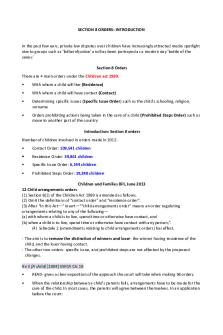Residence - bibi john PDF

| Title | Residence - bibi john |
|---|---|
| Author | Annh Hồng |
| Course | Personal Taxation |
| Institution | Seneca College |
| Pages | 3 |
| File Size | 82.5 KB |
| File Type | |
| Total Downloads | 61 |
| Total Views | 134 |
Summary
bibi john...
Description
RESIDENCE:-INDIVIDUAL: An individual is resident in Canada for tax purposes if Canada is the place where he/she in the daily course of his/her life regularly, normally or customarily live,i.e., there is a continuing state of relationship between a person and a place. There are 4 degrees of residence:1. Full-time 2. Deemed 3. Part-time 4. Non-resident When determining residence the Courts will consider issues of the individuals such as:a. Individuals who are leaving Canada b. Ties within Canada c. Residential ties elsewhere d. Individual’s regularity and lengths of visits to Canada e Non-residence status of the individuals f. Individuals who are coming to Canada f. Deemed resident of Canada g. Persons exempt from taxes. FOR AN INDIVIDUAL LEAVING CANADA: Take the following factors into consideration:The primary residential ties -Dwelling place(or places) -Spouse and dependants -Personal properties and social ties. The Courts have held:Everyone must be resident somewhere and It is quite possible for an individual to be resident in more than one place for tax purposes. REGULARITY AND LENGTH OF VISITIS Where individual leaves Canada and purports to be a non-resident, the individual’s tax status will not be affected by occasional visits to Canada. NON-RESIDENT STATUS The date on which a Canadian resident leaves Canada and becomes non-resident is the least of the dates on which:-The individual leaves Canada -The individual’s spouse and/or dependants leave Canada -The individual becomes a resident of the country to which he/she is immigrating.
COMING TO CANADA Where an individual moves to Canada he/she will become a resident for tax purposes on the date he/she entered Canada. DEEMED RESIDENT OF CANADA Persons listed in S. 250 of the Act. These are:Persons who sojourned to Canada for an aggregate of 183 days in a year Members of the Armed Forces Persons who were officers or servants of a Government of Canada in the year Persons who were members of the Overseas Canadian Forces. PART-TIME RESIDENTS:A part-time resident is a person who had full-time residential ties but leaves Canada at some time in the year. Part of the year he is full time and part of the year is non-resident and is therefore a part time resident. To establish part-time residence the individual must be able to prove that at some time in the year he/she had made a clean break from Canada. NON-RESIDENCE A non-resident will pay Part 1 tax if that person/corporation:a. Was employed in Canada b. Carried on a business in Canada c. Disposed of taxable Canadian property. PERSONS EXEMPT Employees of a Country other than Canada Municipal authorities Charities(registered) Universities and Non-Profit organization Labour organizations Housing companies Pension Trusts Prescribed small business investment corporations Trusts under profit sharing plans Trusts under a registered supplementary unemployment benefit plan Registered educational savings plans.
CORPORATIONS: For Resident:1. Where incorporated 2. Where does central management and control exist. 3. Companies incorporated outside of Canada can still be deemed to be residents of Canada if the central management and control of the Corporation’s Board of Directors occurs in Canada
NON-RESIDENT CORPORATIONS:To be considered a non-resident corporation, the corporation cannot be incorporated in Canada after April 26th, 1965. If a non-resident corporation carried on business in Canada, it is taxable on its Canadian source income. TRUSTS: A trust is generally considered to reside where the trustee, executor, administrator, heir or other legal representatives who manages the trust or controls the trust assets reside....
Similar Free PDFs

Residence - bibi john
- 3 Pages

Week 2 - Residence and source
- 3 Pages

S8 orders - contact & residence
- 20 Pages

Lahiri-Treatment of Bibi haldar
- 7 Pages

Form-EUTR1 Irish Residence Card
- 44 Pages

MSU Texas residence-life-handbook
- 43 Pages

John Hejduk - John Hejduck obras
- 21 Pages

John Osborne
- 1 Pages

John Deere
- 5 Pages

John Graunt
- 8 Pages

John Constable
- 6 Pages

John Smith
- 6 Pages
Popular Institutions
- Tinajero National High School - Annex
- Politeknik Caltex Riau
- Yokohama City University
- SGT University
- University of Al-Qadisiyah
- Divine Word College of Vigan
- Techniek College Rotterdam
- Universidade de Santiago
- Universiti Teknologi MARA Cawangan Johor Kampus Pasir Gudang
- Poltekkes Kemenkes Yogyakarta
- Baguio City National High School
- Colegio san marcos
- preparatoria uno
- Centro de Bachillerato Tecnológico Industrial y de Servicios No. 107
- Dalian Maritime University
- Quang Trung Secondary School
- Colegio Tecnológico en Informática
- Corporación Regional de Educación Superior
- Grupo CEDVA
- Dar Al Uloom University
- Centro de Estudios Preuniversitarios de la Universidad Nacional de Ingeniería
- 上智大学
- Aakash International School, Nuna Majara
- San Felipe Neri Catholic School
- Kang Chiao International School - New Taipei City
- Misamis Occidental National High School
- Institución Educativa Escuela Normal Juan Ladrilleros
- Kolehiyo ng Pantukan
- Batanes State College
- Instituto Continental
- Sekolah Menengah Kejuruan Kesehatan Kaltara (Tarakan)
- Colegio de La Inmaculada Concepcion - Cebu



